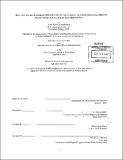| dc.contributor.advisor | Dennis Frenchman. | en_US |
| dc.contributor.author | Schneiderman, Noah Rubin, 1976- | en_US |
| dc.contributor.other | Massachusetts Institute of Technology. Dept. of Urban Studies and Planning. | en_US |
| dc.coverage.spatial | n-us-ma | en_US |
| dc.date.accessioned | 2006-03-29T18:26:41Z | |
| dc.date.available | 2006-03-29T18:26:41Z | |
| dc.date.copyright | 2002 | en_US |
| dc.date.issued | 2002 | en_US |
| dc.identifier.uri | http://hdl.handle.net/1721.1/32237 | |
| dc.description | Thesis (S.M. and M.C.P.)--Massachusetts Institute of Technology, Dept. of Urban Studies and Planning, 2002. | en_US |
| dc.description | Includes bibliographical references (leaves 149-153). | en_US |
| dc.description.abstract | The Massachusetts State College Building Authority (MSCBA) is a state agency that develops and renovates revenue producing facilities, such as residence and dining halls, for the nine state colleges in Massachusetts. The MSCBA sets rents and user fees, makes certain that revenues are adequate to maintain the system and pay debt service at the lowest possible cost to students. Outside of these official roles, the Authority assists the colleges in fulfilling their missions through prudent capital improvement programs, long-range campus planning, and more recently, entrepreneurial real estate ventures. The Massachusetts College of Art (MassArt), the sole Boston-based campus of the state colleges, is the only publicly supported independent college of art and design in the United States. While it is considered one of the premiere art institutions in the country, it is constrained by its existing facilities and the requirements of State funding and centralized decision-making. These factors inhibit it from realizing its overall mission and from competing with peer private art institutions. MSCBA and MassArt have recently initiated a conceptual master planning process in an effort to consolidate the college's space and improve the quality and efficiency of life on campus. In addition, MassArt has identified an annual funding gap, which if filled, would allow it to spend more money per student and protect itself from abrupt declines in state funding. Concurrent with these discussions, the College and the Authority has started to realize the value of its well located, and urban economically underutilized, institutional land. The purpose of this thesis is to define entrepreneurial real estate development opportunities for MassArt that will allow it to fund both the various spatial moves outlined by the planning process, as well as the identified annual revenue shortfall, all while enhancing its institutional mission. In addition to outlining real estate ventures for MassArt in particular, the key questions that this research attempts to answer are: -- What types of real estate development can public colleges undertake that can provide them with a level of independence that allows them to pursue their missions more effectively? -- What are the best forms of procurement alternatives for these ventures that align incentives and balance risk, responsibilities, and rewards between the parties involved? -- Is there an appropriate tradeoff between enhancing an institutional mission and pursuing entrepreneurial real estate activities? | en_US |
| dc.description.statementofresponsibility | by Noah Rubin Schneiderman. | en_US |
| dc.format.extent | 153 leaves | en_US |
| dc.format.extent | 11967824 bytes | |
| dc.format.extent | 11985882 bytes | |
| dc.format.mimetype | application/pdf | |
| dc.format.mimetype | application/pdf | |
| dc.language.iso | eng | en_US |
| dc.publisher | Massachusetts Institute of Technology | en_US |
| dc.rights | M.I.T. theses are protected by copyright. They may be viewed from this source for any purpose, but reproduction or distribution in any format is prohibited without written permission. See provided URL for inquiries about permission. | en_US |
| dc.rights.uri | http://dspace.mit.edu/handle/1721.1/7582 | |
| dc.subject | Urban Studies and Planning. | en_US |
| dc.title | Real estate development opportunities in the context of an institutional mission : Massachusetts College of Art, Boston, MA | en_US |
| dc.type | Thesis | en_US |
| dc.description.degree | S.M.and M.C.P. | en_US |
| dc.contributor.department | Massachusetts Institute of Technology. Department of Urban Studies and Planning | |
| dc.identifier.oclc | 51894980 | en_US |
